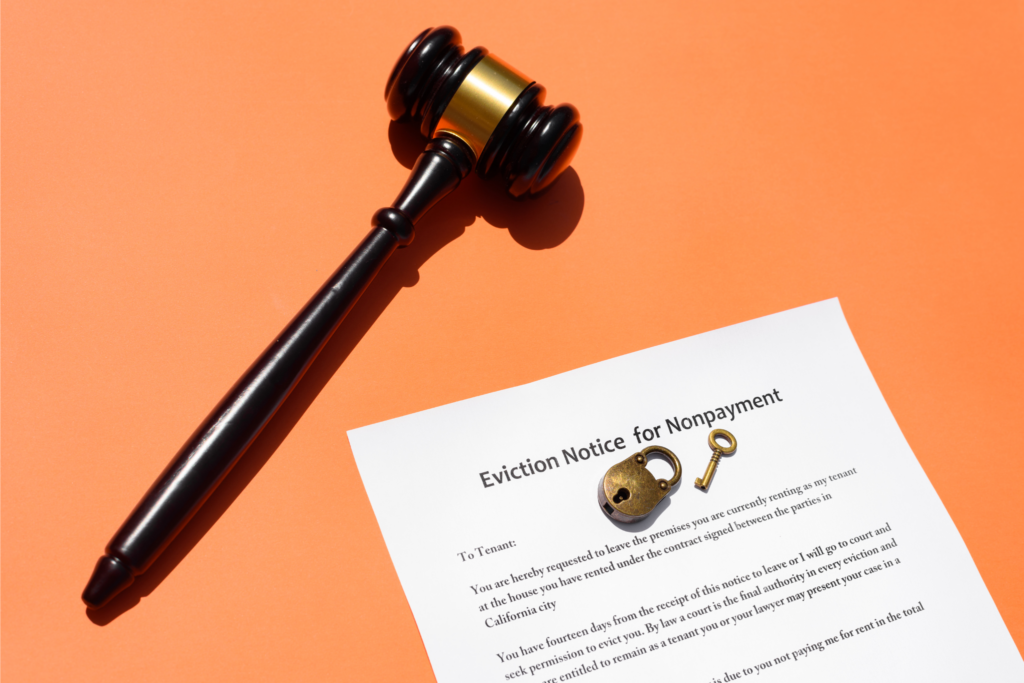Facing eviction can be a daunting experience for any tenant. While eviction is a legal process, tenants do have rights that need to be respected. In this article, we will provide essential advice on what tenants should expect during an eviction process and help them understand their legal rights.
Key Takeaways:
- Eviction is a legal process that requires strict adherence to legal guidelines.
- Tenants have rights that must be respected during an eviction process.
- It’s essential for tenants to understand the legalities involved in an eviction process.
- There are legal resources available to help tenants facing eviction.
- Tenants have the right to seek legal assistance to protect themselves during an eviction process.
Understanding Eviction Notices and Laws

When a landlord decides to evict a tenant, they must provide a written eviction notice. There are different types of eviction notices, each with its own rules and requirements. The most common notices include:
- Pay Rent or Quit Notice: This notice gives tenants a certain amount of time to either pay rent or move out. Typically, this notice will give tenants three to five days.
- Cure or Quit Notice: This notice requires tenants to fix a lease violation, such as having a pet when it’s not allowed or being too noisy. Tenants will have a specific amount of time to resolve the issue before eviction.
- Unconditional Quit Notice: This notice requires tenants to move out without the option to fix any issues or pay rent.
It’s important for tenants to understand the type of eviction notice they receive as it can impact their rights and legal options. The laws governing eviction notices vary by state and can be complex, so it’s advisable for tenants to seek legal advice if they have questions.
| Eviction Law | Description |
|---|---|
| Fair Housing Act | The Fair Housing Act protects tenants from discrimination based on their race, ethnicity, religion, sex, disability, and other characteristics. |
| Landlord-Tenant Law | Each state has its own landlord-tenant laws that dictate the legal eviction process. These laws specify the rights and responsibilities of both landlords and tenants. |
| Civil Procedure Laws | The civil procedure rules for evictions vary by state but generally require formal court proceedings. |
Tenants have rights during the eviction process, including the right to receive proper notice and the opportunity to respond to the notice. Understanding the laws and requirements involved in eviction can help tenants protect their rights and make informed decisions.
You might also like: RENTING WITH EVICTIONS(Opens in a new browser tab)
Responding to an Eviction Notice

Receiving an eviction notice can be a stressful experience, but it’s important to understand your rights and take appropriate action. The first step is to carefully review the notice to determine what type of eviction it is and the reason for it. Ensure that the notice complies with all legal requirements, such as providing sufficient notice period and reason.
If the eviction notice is incorrect or violates your tenant eviction rights, it’s important to take immediate action, such as contacting an attorney or local tenant advocacy group. On the other hand, if the notice is valid, tenants can still take proactive steps to protect their rights and potentially extend the timeline involved in the eviction process.
Some ways tenants can respond to an eviction notice include attending all court hearings, gathering evidence to support their case, and negotiating with the landlord for more time to vacate the property or repayment of owed rent. Additionally, tenants can seek alternative housing options, such as second chance apartments, to avoid homelessness or additional legal repercussions.
Remember, the eviction process timeline can vary, but tenants have the right to due process and protection under the law. Taking appropriate steps to respond to an eviction notice can make a significant difference in the outcome of the case and help tenants protect their rights.
Legal Resources for Tenants
When facing an eviction, it is crucial for tenants to understand their legal rights. Fortunately, there are a variety of legal resources available to assist tenants throughout the eviction process. These resources can offer guidance, support, and representation, helping tenants navigate the complex eviction procedure.
Legal aid organizations are a valuable resource for tenants who need legal representation but cannot afford to hire a private attorney. These organizations typically offer free or reduced-cost legal services to individuals who meet income and asset criteria.
Pro bono services, or volunteer-based legal services, are another option for tenants who cannot afford an attorney. Pro bono services are provided by law firms and individual attorneys who offer their services for free or at a reduced rate.
Tenant advocacy groups can also provide support and guidance during an eviction. These organizations specialize in tenant rights and can help tenants understand their legal rights and options.
Overall, tenants facing eviction should educate themselves on the legal resources available to them. Utilizing these resources can help tenants protect their rights and navigate the eviction procedure with confidence.
You might also like: How To Move Out of Apartments Before The Lease Term is Over(Opens in a new browser tab)
Tenant Rights During the Court Process
As a tenant facing eviction, it’s important to understand your rights during the court process. Once the landlord has filed an eviction lawsuit, you will receive a summons to appear in court and respond to the allegations.
During the trial, both you and the landlord will have the opportunity to present evidence and arguments. As the tenant, you have the right to:
- Present a defense to the eviction
- Question and cross-examine witnesses
- Submit evidence and testimony supporting your defense
- Appeal the eviction judgment
It’s important to note that the court process can be complex and intimidating. Seeking legal representation or assistance from a tenant advocacy group can be helpful in navigating the proceedings and protecting your rights.
Remember, as a tenant, you have legal rights throughout the eviction process. By understanding those rights and taking appropriate action, you may be able to avoid eviction or secure a more favorable outcome.
Possible Outcomes of an Eviction Case
Understanding the possible outcomes of an eviction case can help tenants prepare for what’s to come. Here are the most common scenarios:
| Outcome | Description |
|---|---|
| Eviction Order | When a court rules in favor of the landlord, an eviction order will be issued. The tenant will have to vacate the premises by a specified date. |
| Mediation | In some cases, the landlord and tenant may be able to reach a settlement through mediation. This can involve negotiations on rent, payment plans, or a move-out date. |
| Negotiated Settlement | If the landlord and tenant come to an agreement, they can enter into a negotiated settlement. This can include paying back rent or agreeing to vacate the premises by a particular date. |
It’s important to note that the outcome of an eviction case will depend on various factors, including local laws and the specific circumstances of the case. Tenants should always seek legal advice to protect their rights during the eviction process.
Second Chance Apartments for Texas Residents
For Texas residents facing eviction, the concept of second chance apartments may be a viable alternative. These apartments are specifically designed for those who have faced challenges with renting in the past, including eviction. While requirements for second chance apartments may vary, they generally look beyond credit scores and eviction history, taking into account other factors such as current income and rental history.
Texas residents can explore a range of second chance apartment options across the state, with many of these apartments located in larger urban areas such as Dallas and Houston. Platforms such as SecondChanceApartments.com offer an online search tool to help tenants find available housing options, with many offering affordable rates and move-in specials.
It’s important to note that second chance apartments may have higher rental rates or stricter lease terms than traditional apartments. Tenants should carefully review their lease agreements and ensure they fully understand their obligations before signing on the dotted line.
Seeking Legal Assistance
If you are facing eviction and have questions about your rights or the legal process, seeking legal assistance is crucial. An attorney can provide legal guidance and support during a stressful and often confusing time.
It is essential to understand tenant eviction rights, eviction laws, and the eviction procedure to protect yourself fully. An experienced lawyer can help you navigate this process and ensure that your rights are being respected.
There are several ways to find legal assistance in your area, including legal aid organizations, pro bono services, and tenant advocacy groups.
These resources offer free or low-cost legal assistance to those in need. A legal aid organization can provide free legal representation to low-income individuals, while pro bono services offer volunteer lawyers who donate their time and expertise to help those in need.
When searching for legal assistance, it is essential to find an attorney who specializes in tenant eviction cases and has experience in your state’s laws.
Remember that seeking legal assistance is not a sign of weakness; it is a proactive step to protecting your rights as a tenant.
You might also like: RENTAL CONTRACTS(Opens in a new browser tab)
Conclusion
As a tenant facing eviction, it is important to understand your rights and the eviction process. By knowing what to expect and seeking legal assistance when necessary, you can protect yourself and your family. Remember to respond to eviction notices in a timely and appropriate manner, and explore alternative housing options such as second chance apartments if necessary.
There are legal resources available to assist you throughout the eviction process, including tenant advocacy groups and legal aid organizations. Don’t hesitate to reach out for support and guidance.
Finally, it’s important to remain proactive and take action to protect your rights. By staying informed and aware of your legal options, you can navigate the eviction process with confidence.
In conclusion, know your rights, seek legal assistance, and take action to protect yourself during the eviction process. With the right resources and support, you can successfully navigate this difficult situation and move forward with your life.

 We are Licensed Texas Real Estate Agents who help individuals with Bad credit, Bankruptcy, Broken leases, Evictions, and felonies locate quality housing. We even assist first-time renters as well. With years of experience, we have developed special relationships with multiple apartment complexes located in Texas.
We are Licensed Texas Real Estate Agents who help individuals with Bad credit, Bankruptcy, Broken leases, Evictions, and felonies locate quality housing. We even assist first-time renters as well. With years of experience, we have developed special relationships with multiple apartment complexes located in Texas.
Leave a Reply